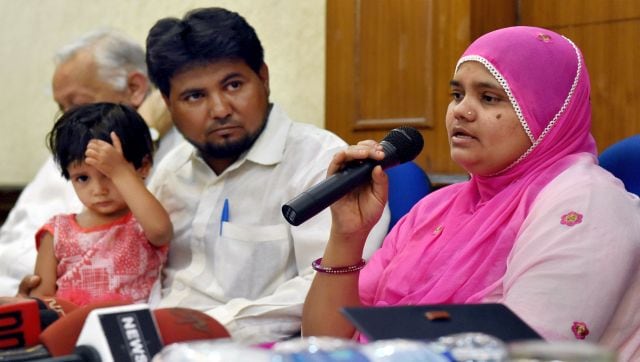Bilkis Bano must have heaved a sigh of relief today (8 January) as the Supreme Court quashed the Gujarat government’s order granting remission to 11 convicts in the 2002 Bilkis Bano gang rape and murder case.
A bench comprising Justices BV Nagarathna and Ujjal Bhuyan in its order said that the Gujarat Government had no jurisdiction to entertain the application for remission of the convicts in the Bilkis Bano case, adding that the appropriate government to decide on remission is the state within whose territorial limits the accused are sentenced and not where the crime is committed or the accused are imprisoned.
The apex court further stated that the Gujarat government’s remission order was without application of mind, with the justices asked whether “heinous crimes against women permit remission” whatever faith she may follow or creed she may belong to.
Her family, according to sources speaking to Indian Express, was relieved with the judgment but yet wary. A source close to Bilkis told Indian Express, “The SC order has reinstated our faith in the judiciary and it gives us consolation that justice is alive… But, we cannot feel victorious yet as the convicts will prepare to apply for remission from the other state… There is a doubt in our minds at the moment if the court will consider the plea of the convicts to remain outside prison while applying for remission. It seems like the fight is not over yet, until they are sent back to jail.”
The order comes after the Gujarat government had in August 2022 released 11 men convicted of Bilkis’ gang rape and the killing of her family, causing a furore in society and leaving Bilkis numb and speechless.
We take a closer look at what exactly was the case, how were these men let off and what followed.
Who is Bilkis Bano?
Gujarat had turned violent after the Sabarmati train was burnt in Godhra on 27 February 2002. Fifty-nine karsevaks were killed in the train.
Fearing the outbreak of violence, a then five-month pregnant Bilkis Bano fled from Randhikpur, her village, with her three-and-a-half-year-old daughter and 15 other family members.
They took refuge in the Chhaparvad district. However, on 3 March, they were attacked by about 20-30 people armed with sickles, swords, and sticks. Among the attackers were the 11 accused men.
Bilkis, her mother, and three other women were raped and brutally assaulted. Of the 17-member group of Muslims from Radhikpur village, eight were found dead, six were missing. Only Bilkis, a man, and a three-year-old survived the attack. As per multiple reports, Bilkis regained consciousness three hours after the incident and after borrowing clothes from an adivasi woman made her way to the Limkheda police station to register a complaint.
Bilkis was taken to a public hospital for medical examination only after she reached the Godhra relief camp. Her case was taken up by the National Human Rights Commission (NHRC) and Supreme Court, which ordered an investigation by the CBI.
What happened in the Bilkis Bano case?
The accused in the case were arrested in 2004 and the trial began in Ahmedabad. However, after Bilkis expressed apprehensions that witnesses could be harmed and the evidence collected by the CBI tampered with, the apex court transferred the case to Mumbai.
On 21 January 2008, the Special CBI Court sentenced 11 accused to life imprisonment on the charges of conspiring to rape a pregnant woman, murder and unlawful assembly under the Indian Penal Code. The court acquitted seven other accused for lack of evidence. One of the accused had died during the trial.
The court held that Jaswantbhai Nai, Govindbhai Nai, and Naresh Kumar Mordhiya (deceased) had raped Bilkis, while Shailesh Bhatt had killed her daughter, Saleha, by “smashing” her on the ground.
Also read: Bilkis Bano case: Rape has no religion, but it can be used as lethal weapon against a community
Others who were convicted are Radheshyam Shah, Bipin Chandra Joshi, Kesarbhai Vohania, Pradeep Vohania, Bakabhai Vohania, Rajubhai Soni, Nitesh Bhatt, Ramesh Chandana, and Head Constable Somabhai Gori.
According to Indian Express, Judge Salvi termed Bilkis’ “courageous deposition as the turning point in the case.”
Almost 10 years after this, the Bombay High Court, in May 2017, upheld the conviction and life imprisonment of 11 people in the gang rape case.
In 2019, the Supreme Court awarded compensation of Rs 50 lakh to Bilkis — the first such order in a case related to the 2002 riots. “It is very apparent that what should not have happened has happened and the state has to give compensation,” the apex court bench of the then Chief Justice of India Ranjan Gogoi, and Justices Deepak Gupta and Sanjiv Khanna, had said.
How did the convicts get early release?
On 15 August 2022, the 11 convicts were released from Godhra sub-jail, with the Gujarat government citing their good behaviour as the reason for their release.
This move came after one of the convicts, Radheshyam Shah, had earlier approached the Gujarat High Court seeking remission of the sentence under sections 432 and 433 of the Code of Criminal Procedure. The high court dismissed his plea while observing that the “appropriate government” to take a decision about his remission is Maharashtra, and not Gujarat.
Shah then filed a plea in the Supreme Court, pleading that he had been in jail for 15 years and four months without remission as of 1 April 2022.
The apex court directed the Gujarat government to look into the issue of remission of his sentence following which the government formed a committee, said Panchmahal Collector Sujal Mayatra, who headed the committee.
“A committee formed a few months back took a unanimous decision in favour of remission of all the 11 convicts in the case. The recommendation was sent to the state government, and we received the orders for their release,” said Mayatra.
When asked about the release, Gujarat Additional Chief Secretary, Home, Raj Kumar, had told news agency PTI that the Supreme Court had asked the government to consider early release of these 11 convicts under the state’s remission policy which was in effect when they were pronounced guilty in the case by the trial court.
“These 11 persons were convicted by a special court in Mumbai in 2008. At the time of conviction, Gujarat was following a remission policy which came into effect in 1992. When the matter reached the Supreme Court, it directed us to decide about the release under the 1992 policy, because that was prevalent when conviction came in 2008,” Kumar told PTI.
What did the SC rule now and what comes next?
The release of the convicts caused a huge hue and cry, with Bilkis approaching the Supreme Court in November 2022 challenging the ‘premature’ release of them, saying it had “shaken the conscience of society.”
Besides the petition filed by Bilkis Bano, several other PILs had challenged the rapists’ early release in the Supreme Court.
And on Monday (8 January), the apex court handed down a 100-page judgment in which it struck down the remission orders to the convicts. The bench said, “We need not have gone into the other issues. But for sake of completion, we have. Rule of law is breached because the Gujarat government usurped power not vested in it and abused its power. On that ground also, the remission orders deserve to be quashed.” Furthermore, the top court nullified its 13 May 2022 order of another bench asking the Gujarat government to consider a remission plea of one of the convicts as the order was obtained by “playing fraud on the court” and by suppressing material facts.
The Supreme Court has now ordered the men to return to jail within two weeks.
With inputs from agencies
Link to article –
Bilkis Bano’s rapists to return to jail: What is the 2002 case? Why were the convicts freed?





